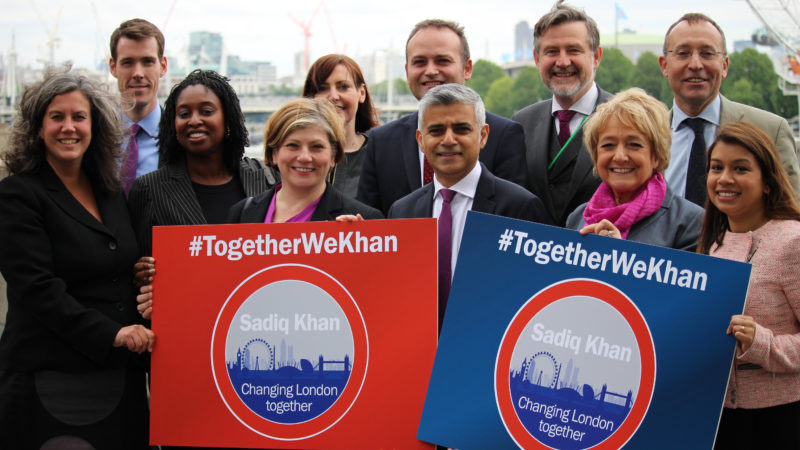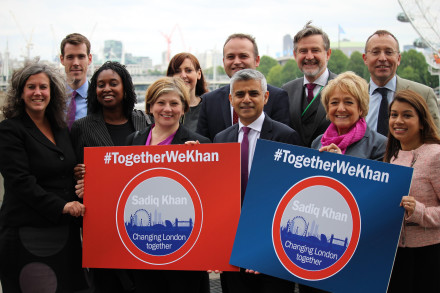

It’s been touted as a close race for weeks now, but Labour’s London mayoral result was a surprise to many. In the final round of voting, Sadiq Khan triumphed with a significant victory – 59% to over long-perceived frontrunner Tessa Jowell’s 41%. How did he do it?
Khan’s team have said from the offset that their strategy was to focus on their own campaign and not compare it to Jowell’s. They had clear messages on key issues like housing (to build more affordable housing) and transport (freezing tube and train fares until 2020) that they repeated over and again. Although Jowell too had hallmark policies, Khan’s clarity clearly cut through.
He represents London’s diversity in a way that Jowell doesn’t. As a Muslim and the son of immigrants Khan speaks in a firsthand way about the benefits of immigration – one of the most regularly mentioned topics – that will sit well with members and supporters. Many also feel that it is, quite frankly, about time Labour elected an ethnic minority candidate for one of the top jobs.
With these policies, the MP for Tooting tried to appeal to all sections of the selectorate and it worked; in the last round of voting he came first among members, supporters and affiliates (the final group had the lowest turnout of the contest). In particular, his triumph over a well-known and well-respected politician like Jowell among party members speaks to the membership’s shift to the left in the recent years. No longer do the Blairites dominate the ranks.
What’s perhaps most interesting is Khan’s success among registered supporters; straightforward claims that he’s benefitted from the “Corbyn surge” don’t quite sit right. It’s thought most registered supporters have paid their £3 to vote for Jeremy Corbyn, but strong Mayoral contender Diane Abbott – who secured a very respectable third place – is a far closer match to Corbyn’s politics than Khan. Yet in the first round of voting she secured 6,126 to his 11,077. Three distinct factors stood Khan in good stead. Firstly: recruitment. It’s thought Khan’s team were particularly good at recruiting registered supporters – they aren’t solely people who’ve come in to vote Corbyn.
Secondly, money and volunteers played a part. Both Khan and Jowell had far more resources at their disposal than the other candidates – the former secured money from the trade unions, while the latter money from the Blairite wing of the party. It also looks as thought the MP for Tooting also had a sizeable campaigning base, which meant comparatively good contact rates.
Thirdly, the high profile figures who came out to advocate for Khan will have played a part in encouraging Corbyn supporters to vote for the former justice minister. Along with David Lammy, Gareth Thomas and Abbott, Khan nominated Corbyn – but unlike Abbott he hasn’t come out in support for Corbyn since. However, his perceived identification with Corbyn will have been strengthened by figures such as former Mayor, Ken Livingstone, and Corbyn’s only shadow cabinet supporter, Jon Trickett, backing him and not Abbott.
The preconception that Jowell was the frontrunner looks it was, in part, media narrative. Before candidates declared their intention to run, Jowell was touted in the media as the frontrunner but just because the media says something is true, doesn’t make it so. Although there’s a potential power in this kind of narrative, it wasn’t hammered away at enough to influence voters’ thinking. From the first round, Khan had a significant lead on Jowell with 37.5% to her 29.7%. He picked up nearly all of Gareth Thomas’ second preferences and double the amount of second preferences from David Lammy voters than Jowell. These huge leads suggest that alongside all of Khan’s other strengths, what was first seen as Jowell’s perceived lead might have always been partly rooted in myth.
Now Khan’s job is to focus on the next tough contest ahead of him, the London Mayor race. If Zac Goldsmith is the Conservative’s candidate for the mayoralty the Tories will throw money at the campaign and most likely engage in some dirty tactics to put obstacles in Khan’s. The message from Labour members, supporters and affiliates is that he’s up to the challenge. We know from today’s huge victory, he can certainly confound expectations.




More from LabourList
Reeves bets on patience over populism
‘Energy efficiency changes must work for older private renters’
‘Labour’s creative destruction dilemma’